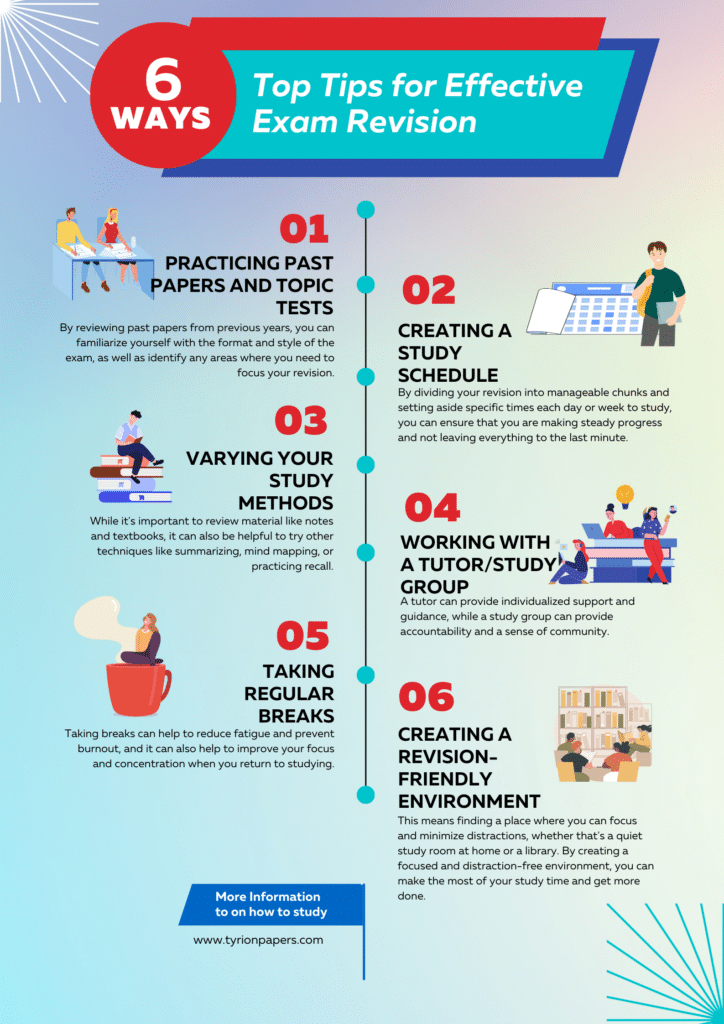Exam season can be a stressful and overwhelming time, especially if you’re not sure how to approach your revision. In this blog post, we’ll explore some top tips for effective exam revision that can help you to maximize your learning and improve your performance on exams like GCSE, IGCSE, and A Level, with a focus on the importance of practicing past papers and topic tests.
Practicing Past Papers and Topic Tests
One of the most effective ways to prepare for exams like AQA, Edexcel, and OCR is to practice past papers and topic tests. By reviewing past papers from previous years, you can familiarize yourself with the format and style of the exam, as well as identify any areas where you need to focus your revision. Regularly practicing past papers and topic tests can also help to improve your exam technique and time management, as you can get a sense of how long it takes you to complete each section and whether you need to pace yourself more effectively.
Creating a Study Schedule
In addition to practicing past papers and topic tests, it’s also important to create a study schedule for GCSE, IGCSE, and A Level exams. By dividing your revision into manageable chunks and setting aside specific times each day or week to study, you can ensure that you are making steady progress and not leaving everything to the last minute. When creating a study schedule, be sure to take into account any other commitments you have, such as work or extracurricular activities, and try to find a balance that works for you.
Varying Your Study Methods
Another key tip for effective exam revision is to vary your study methods. While it’s important to review material like notes and textbooks, it can also be helpful to try other techniques like summarizing, mind mapping, or practicing recall. Varying your study methods can help to keep you engaged and prevent boredom, and it can also help to reinforce your learning by engaging different parts of your brain.
Working with a Tutor or Study Group for GCSE, IGCSE, and A Level Exams
In addition to creating a study schedule and practicing past papers and topic tests, it can also be helpful to work with a tutor or study group for GCSE, IGCSE, and A Level exams. A tutor can provide individualized support and guidance, while a study group can provide accountability and a sense of community. Working with others can also help to keep you motivated and on track, and it can be a great way to review material together and reinforce your learning.
Taking Regular breaks
Another important aspect of effective exam revision is taking regular breaks. While it’s important to be diligent in your revision, it’s also important to give your brain time to rest and process what you have learned. Taking breaks can help to reduce fatigue and prevent burnout, and it can also help to improve your focus and concentration when you return to studying. When taking breaks, try to do something that is completely unrelated to your studies, like going for a walk or chatting with friends. This can help to give your mind a chance to relax and recharge.
Creating a Revision-Friendly Environment
It’s also important to create a revision-friendly environment for GCSE, IGCSE, and A Level exams. This means finding a place where you can focus and minimize distractions, whether that’s a quiet study room at home or a library. It can also be helpful to eliminate unnecessary distractions, like turning off your phone or logging out of social media while you’re studying. By creating a focused and distraction-free environment, you can make the most of your study time and get more done.
Finally, don’t forget to take care of yourself during exam season. This means getting enough sleep, eating well, and making time for physical activity and relaxation. Taking care of your physical and mental health can help to improve.

